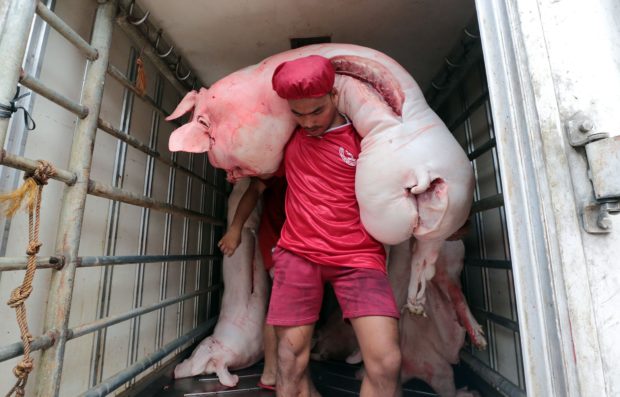DA: ASF in Bulacan, Rizal areas ‘may be an outbreak but not an epidemic’

SAFE TO EAT Inspected pork is delivered to meat vendors at Commonwealth Market in Quezon City on Wednesday, August 21, 2019. The Bureau of Animal Industry urges hog raisers to improve security measures to keep African swine fever out of the country. INQUIRER.net/GRIG C. MONTEGRANDE
MANILA, Philippines — The Department of Agriculture (DA) said Monday that African Swine Fever (ASF) cases in several areas in Bulacan and Rizal “may be considered an outbreak but not an epidemic.”
DA Secretary William Dar said in a statement that ASF has already been contained in Barangay Pritil in Guiguinto, Bulacan; and in several barangays in the towns of Rodriguez, San Mateo, and Antipolo, in Rizal province.
Dar said a total of 7,416 pigs within the one-kilometer radius in ASF areas in Rizal and Bulacan have already been depopulated, citing one ASF-infected slaughterhouse in San Mateo that had since been closed and disinfected.
The agriculture department further stressed that its efforts to manage, contain, and control the spread of the disease continues with the help of local government units (LGUs), the private sector, the Philippine National Police (PNP), and the military through the imposition of biosecurity and quarantine measures.
Dar also assured that supply and prices of pork will not be affected as he called the media and the public not to release unverified information regarding the situation to avoid spreading fear among consumers.
Dar said such disinformation could damage the P260-billion swine industry.
According to the Food and Drug Administration (FDA), ASF is a “highly contagious” hemorrhagic disease of pigs, warthogs, European wild boar, and American wild pigs.
In animals, the ASF virus causes fever, loss of appetite, hemorrhages in the skin and internal organs, and even death.
FDA said the disease, though not considered a “human health threat,” had caused major economic loss in the swine industry. /kga